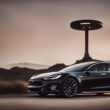The fuel cell can be a battery alternative for electric cars. However, initially in the freight transport sector, if you look at the current plans of the industry.
Hydrogen is the chemical element of the hour. Many countries want to base their economies on energy-containing gas instead of crude oil in order to get a grip on CO2 emissions. And mobility should also become greener thanks to fuel cells and H2 engines - on the rails, in the air, on the water and on the road. According to a recent survey by Küs, 73 percent of those surveyed named the fuel cell as the ecological alternative and placed it clearly in front of battery-electric vehicles. But it's not quite that far yet. An overview of the current projects.

The idea behind the use of the fuel cell is the same in every vehicle segment: the small on-board power plant replaces the battery in order to enable greater ranges. Because the gas tanks are voluminous, but significantly lighter and cheaper than batteries. In addition, at least in theory, they can be refilled quickly. There are also a number of other advantages: For example, the independence from temperature - unlike battery electric cars, the range of fuel cell vehicles does not suffer in winter. The hydrogen combustion engine, where gas is used instead of gasoline or diesel, also offers similar advantages over battery-powered cars. However, there are also numerous problems. The biggest: The fuel cell is only useful for the climate if the hydrogen is “green” and is produced from renewable energies. So far, this has rarely been the case. And even where it happens, the overall efficiency is significantly worse than that of battery electric cars. The fuel cell could only become good business for the environment in the long term. That is when large quantities of the gas from African electrolysers are shipped to Europe. Plans for the development of infrastructures and initial strategic partnerships are already in place until the supply chain starts rolling, but several generations of vehicles are likely to come onto the market.
Nevertheless, the auto industry is already preparing. Also because other countries like Japan or China have also started building a hydrogen economy.

There is currently comparatively little movement in cars. The idea of running electric cars with fuel cells is decades old. However, the results of research and development to date are manageable. Few hundred cars have been on German roads so far, and there are currently just two models available to buy or lease: the Hyundai Nexo and the Toyota Mirai. With the BMW X5 Hydrogen, a technology offshoot of the Japanese will be launched in 2022 as part of a pilot test in small series, larger numbers are to be built from 2025. Hyundai, on the other hand, could launch a fuel cell variant of its Staria minibus in the coming years, but nothing has been officially confirmed yet. There are more new car announcements only in China, where several manufacturers want to put their own fuel cell cars on the road. It is questionable whether they will make it to Europe. In general, western and especially German car manufacturers cannot warm up to the topic: Volkswagen has confirmed once again in future that hydrogen is not an issue. Daimler, too, recently put its development on hold.

Hydrogen and fuel cells are likely to have better opportunities in the van segment than in cars. There, at least in some areas, greater ranges are required than can currently be achieved with batteries at a reasonable price. The French manufacturers in particular want to use H2 technology to make their delivery vehicles suitable for long journeys - in line with the government's funding plans announced last autumn, which intends to invest heavily in building a hydrogen economy. The plans of the PSA Group, which wants to bring hydrogen variants of the Opel Vivaro, Peugeot Expert and Citroën Jumpy vans to the streets this year, are relatively specific. The car manufacturer gets its fuel cells from Symbio, a joint venture between Michelin and Faurecia, which is emerging as Europe's market leader in this technology. In the vans, the cell primarily functions as a range extender; on short journeys, the electricity is to be drawn from a relatively large on-board battery. Competitor Renault is pursuing a similar hybrid concept, and wants to equip its medium-sized and large vans with cells from the US company Plug Power.

The fuel cell has perhaps the best prospects in heavy trucks. There, the batteries required for long ranges press heavily on the payload, whereas space is not a problem, so that larger gas tanks could also be accommodated. The industry is driving development accordingly vigorously. Most recently, for example, Daimler and Volvo Trucks signed a fuel cell alliance that will begin large-scale production from 2025. VW subsidiary Traton, Toyota and Hyundai are also involved in H2 trucks, as are US companies Kenworth and Nikola. Individual developers such as AVL are also working on H2 combustion engines. However, the prerequisite for the breakthrough of the hydrogen truck is likely to be the rapid construction of the necessary infrastructure on trunk roads. Industry and environmental associations are calling for around 1.000 systems across Europe by 2030. The smaller vehicle segments could ultimately also benefit from this. Because where there is hydrogen for large cars, smaller commercial vehicles and passenger cars can in principle also refuel.





